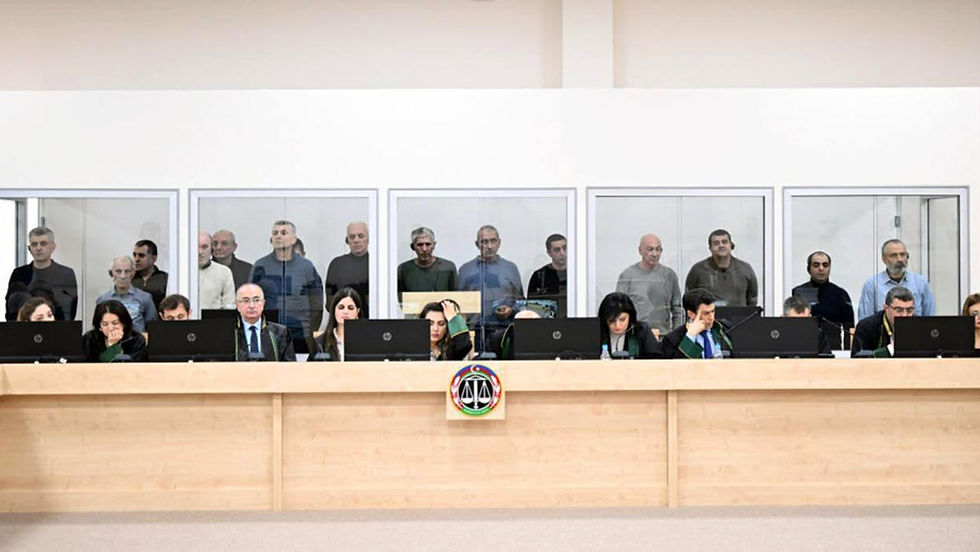Human Rights Attorney Warns: Azerbaijan’s Life Sentences for Artsakh Leaders ‘Completely Illegal’ and Politically Driven
- Nov 18, 2025
- 4 min read

In an exclusive interview with The Armenian Report, attorney Siranush Sahakyan, who represents Armenian prisoners of war and detainees held in Azerbaijan, gave a detailed and urgent explanation of why the harsh sentences demanded by Azerbaijani prosecutors are illegal under international law. Her explanation shows how Baku is using its courts as tools of political revenge against the people of Artsakh.
This interview was taken a day after Azerbaijan announced life imprisonment and long-term sentences for former political and military leaders of the Republic of Artsakh.

Sahakyan’s analysis shows that these trials are not about justice—they are about punishing Armenians for exercising their rights.
“They are being punished for exercising the right to self-determination”
Sahakyan began by clarifying that the prosecutor’s demands are only proposals on paper. But in Azerbaijan’s controlled judicial system, the outcome is predetermined:
“Let me clarify that the prosecutor only proposes the types of punishment, and the final decision will still be made by the court. However, considering that these judicial processes are the result of a political order, it is clear that the Azerbaijani courts will adopt exactly these proposals.”
She emphasized that the true problem is not even the length of the sentences, but the reason for the convictions:
“The main issue here is not so much the length of the sentences, but the issuance of guilty verdicts for actions connected to the exercise of rights.”

According to her, the charges aim to criminalize the existence and functioning of Artsakh:
“In this case, 16 individuals are being punished for exercising the right to self-determination, for carrying out lawful activities within the self-determined Artsakh and its administrative structures. This is completely incompatible with international human rights standards.”
Azerbaijan calls these acts “terrorism,” “war crimes,” or “illegal armed groups,” but Sahakyan is clear:
“However, they have no relation whatsoever to the actions of the Armenians.”
International courts can invalidate the trials
Sahakyan explained that Azerbaijan’s judiciary cannot provide justice because it follows political orders. Therefore, the path to justice lies in supranational bodies:
“Regarding legal avenues, there are several legal directions, some of which are judicial… supranational international courts also operate, such as the European Court of Human Rights.”
She listed Azerbaijan’s existing record of losing cases involving political prisoners, dissidents, and human rights defenders. In many of those cases, the European Court of Human Rights (ECHR) ruled that Azerbaijan must release the detainees.
Sahakyan pointed to one essential precedent:
“The issue of politically motivated criminal prosecutions has been studied in great detail specifically in the Azerbaijani context. In this regard, the case of Ilgar Mammadov is a landmark one.”
In that case, the ECHR ruled that Azerbaijan had acted politically, not legally. When Azerbaijan refused to release Mammadov, the Council of Europe launched an infringement procedure—an extraordinary step used only against states that deliberately break the rules.
Sahakyan said this same process should be applied to Armenian political prisoners.

Most Armenian cases are already before the European Court
Sahakyan confirmed that Armenia has already submitted almost all relevant cases to the ECHR:
“At the moment, the cases of 22 out of the 23 Armenians held in Azerbaijan have been submitted within the framework of an interstate complaint.”
She explained that the Court is being regularly updated:
“I note that the entire process concerning unlawful deprivation of liberty and unlawful trials has been presented to the Court, and we expect judicial acts establishing violations of the right to a fair trial and the right to personal liberty.”
This means that Azerbaijan’s fabricated charges and sham trials are already under international examination.

Only political pressure can force Azerbaijan to comply
Sahakyan said that authoritarian states driven by political motives rarely correct their own violations. They ignore legal obligations unless pressured from outside:
“In cases of politically motivated convictions, it is clear that the state, driven by the same political motives, refrains from eliminating the violations… Therefore, political pressure from international courts, organizations, and bodies is essential.”
She explained that once the ECHR issues binding judgments, those decisions are transferred to political bodies for enforcement. These bodies—within the Council of Europe—have the power to apply pressure on Baku.

Sahakyan believes this method can succeed with Armenian captives:
“In my assessment, increased political pressure in the cases of Armenian captives is realistic… Under such conditions, practical release by Azerbaijan becomes realistic.”
When trials violate fair-trial rights, detention becomes illegal
Sahakyan clearly outlined the legal basis for release under international law:
“Every deprivation of liberty must have a clear legal and factual basis… When courts determine that such guarantees were not provided, they record a violation of the right to a fair trial.”
If the ECHR finds violations of Articles 5 and 6—rights to liberty and fair trial—then the convictions issued by Azerbaijan cannot be used to justify continued imprisonment:
“In such cases, the conviction cannot serve as a legitimate basis for deprivation of liberty, and international bodies formulate a legal requirement for release.”
A legal and political battle for the freedom of Armenian captives
Sahakyan’s interview shows that Azerbaijan’s prosecutions of Artsakh leaders are not just unfair—they attack the core rights of an entire people. The Armenians being held by Azerbaijan are not criminals. They are leaders who carried out their duties within the democratic structures of Artsakh and protected their community.
Her analysis makes clear that:
Azerbaijan’s trials are political.
The charges are fabricated.
The sentences are designed to erase Artsakh.
International courts have the authority to overturn these convictions.
Political pressure can force Baku to release Armenian captives.
—
Support independent reporting from the region by subscribing to The Armenian Report. Our team is funded solely by readers like you.






Comments